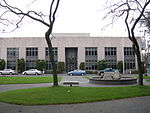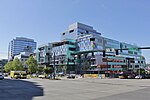On April 27, 2019, at approximately 3:28 p.m. Pacific Time, a construction crane working on a Google office building in Seattle, Washington, United States, collapsed onto Mercer Street, killing four people and injuring four others. The crane, which was being dismantled, fell across the street and its median, crushing six cars near the Fairview Avenue intersection. It also damaged the building's roof and eastern facade. Two of the four victims were ironworkers, while the others, a college student and a former city administrator, were in vehicles on the street.Several strong gusts of wind were reported in the area, including one recorded at a speed of 23 miles per hour (37 km/h) at the time of the collapse, and was briefly theorized as a factor in the collapse. The collapse was captured in a dashcam video that was posted online the day after the accident, showing the perspective from westbound Mercer Street.Seattle has undergone a construction boom since the Great Recession, tallying 60 cranes in early 2019—the most in one city in the United States at the time. The last local crane incident to include fatalities occurred in November 2006 during construction of the Expedia Building in Bellevue, which killed one person in a nearby building. As a result, Washington adopted laws to enforce stricter crane safety policies, including enhanced operator certification and training.The Washington State Department of Labor and Industries began an investigation into the incident, with cooperation from developer Vulcan, Inc., the City of Seattle, and general contractor GLY Construction. The collapse's cause was initially unknown, although outside investigators had speculated that the improper removal of pins and bolts during disassembly was a potential cause. Mercer Street remained shut down for the weekend and re-opened on Monday morning, following removal of the crane and debris to a nearby lot.











